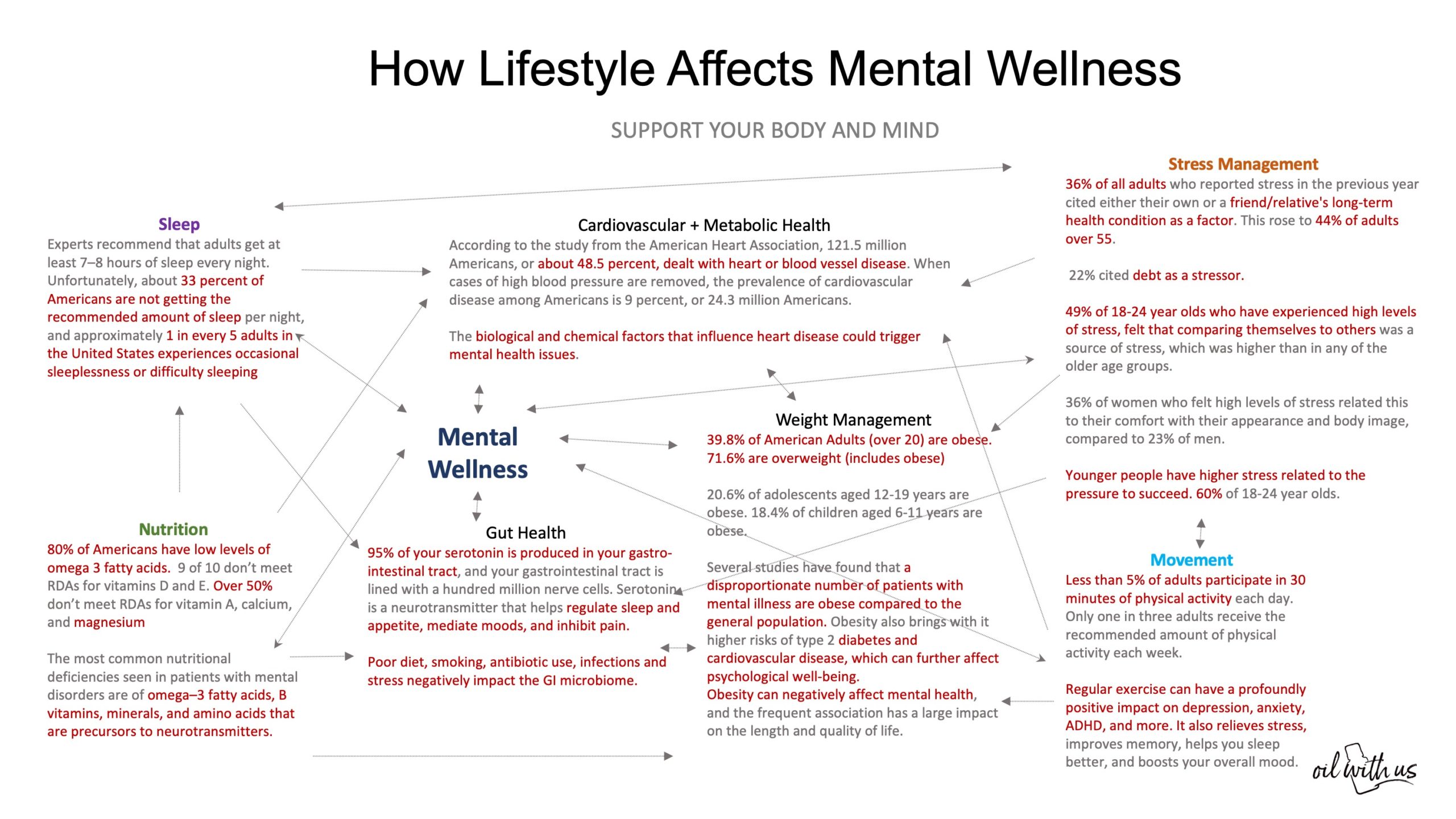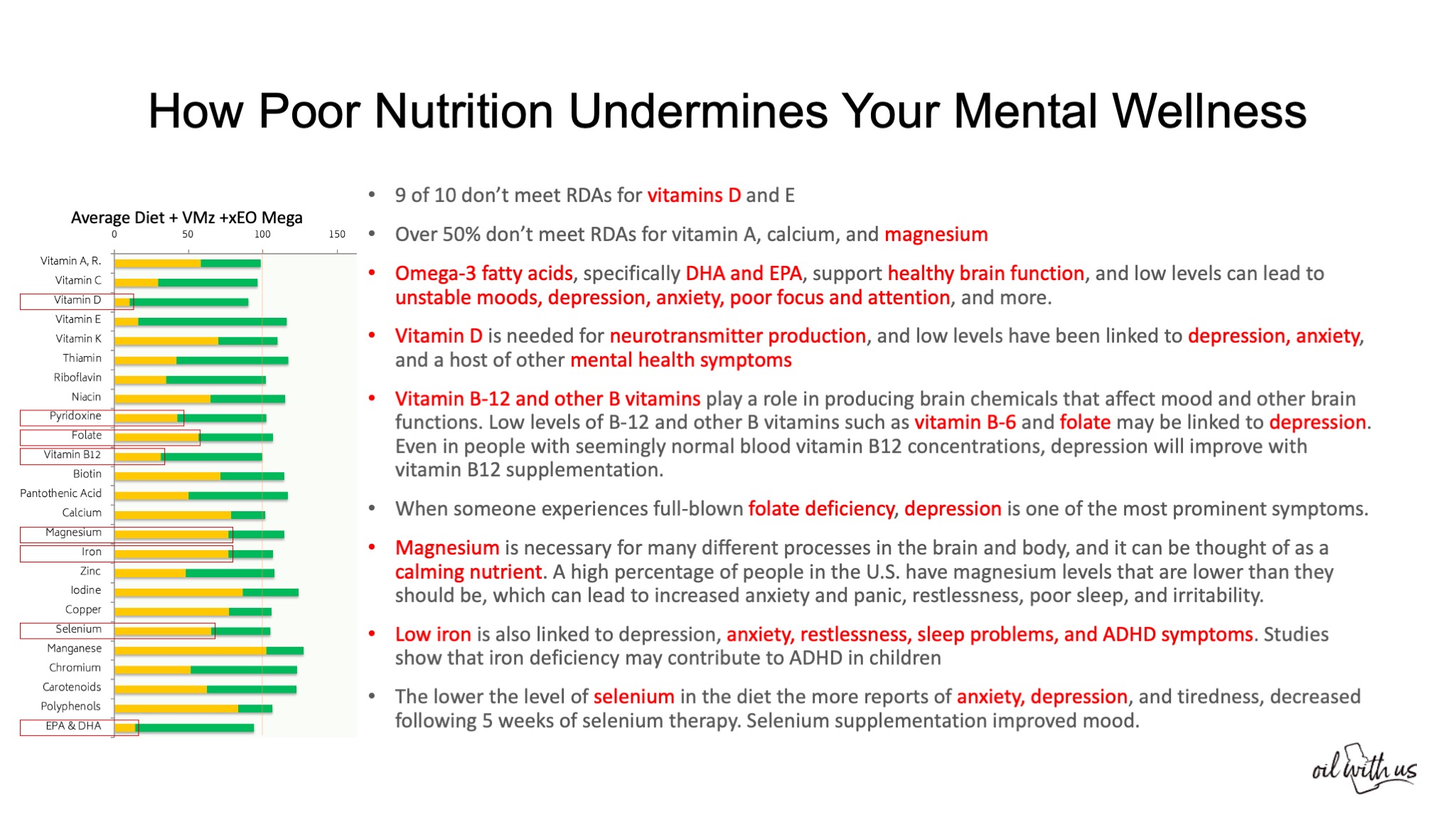Mental health is important to me. I know what it’s like to not feel in control of my thoughts and emotions. It’s not very pleasant. It affects how I work. It affects my personal relationships. It affects my quality of life. It keeps me from living life to the fullest and living out my purpose and helping others.
There are many ways to address mental health. I’ve addressed my mental health in different ways.
- I’ve sought professional help through therapy and medical treatments
- I’ve sought healing through faith and prayers
- I’ve made lifestyle changes to improve my sleep, manage stress, improved my nutrition and incorporated phytotherapy (the use of plants and other natural substances) in my life
I’ve found that improving my physical health greatly improved my mental health. When I first saw a psychiatrist when I was 18, he emphasized the importance of taking care of my physical health and that it was essential for my recovery. Talk therapy and other treatments alone may not be enough. If I wanted the best recovery, I needed to address my poor eating habits (nutrition), sedentary lifestyle, and sleep.
He gave me general advice on how to address these issues, nothing too specific, but some small tips and tricks. It wasn’t his focus, he primarily focused on talk therapy and biological psychiatry (pharmacological treatment). It was up to me to figure how I best wanted to support my physical health. Even after I discontinued therapy and treatment, his advice stuck with me. I looked for ways to improve my physical health to support my mental wellness.

Sleep
In my sessions, I remember the first issue we addressed was sleep. There is a correlation between sleep and mental disorders. My therapist illustrated that point by sharing that driving sleep deprived was just as bad or even worse than drunk driving. Later on in life, I would attend a lecture by Dr. Russel Foster, professor of circadian neuroscience and a leading authority on sleep, where I learned a more in depth explanation of the importance of sleep. You can check out his Ted Talk “Why We Sleep” to learn more. Sleep is extremely important. In society, the importance of sleep is understated. We know it’s important, but we don’t realize how extremely important it is and there may be a correlation to the increase of mental disorders to the sleep that people receive.

My psychiatrist prescribed Ambien to aid me in sleep. He warned me that I should not become dependent on it. He explained that Ambien wasn’t a pill I’d take in order to sleep every night, he just wanted to help aid me in getting to a routine. Ultimately, he wanted me to be able to sleep without the aid of pharmaceutical sedative. He shared some of the negative consequences of patients that abuse Ambien. He gave some tips on regulating sleep, like exposure to light, the type of activities, my eating schedules. Many of this is echoed in greater detail by Dr. Russel Foster in “Why We Sleep.”
Here are some small tips on sleep:
- Stick to a sleep schedule
- Pay attention to what you eat and drink
- Create a restful environment
- Include physical activity in your daily routine
- Manage worry
- Be mindful of light exposure
Disclaimer: I am not a doctor. Any recommendations should be discussed with your doctor or medical provider to go over any risks or benefits.
Nutrition
When I first had my nervous breakdown, I stopped eating. I didn’t really have much of an appetite and I developed the habit of skipping meals and just eating sporadically. When I did ate, I prioritized convenience over nutrition. My therapist suggested that I start a routine of eating regularly as away to work up an appetite. I went off to college and had a meal plan that was buffet style. Having a schedule and easy access to a variety of food, really helped in my nutrition. I believe that it contributed to my mental and emotional wellbeing.

When I withdrew from my studies, I returned home. Because of financial hardships, I prioritized cost over nutrition, often eating processed meats like hot dogs with a rice as my starch. Again I skipped meals. My occasional treat was a cheeseburger or chicken sandwich from the McDonald’s “value menu.” What started out as a necessity for financial survival, ended up being a habit even after my finances improved. I continued to skip meals and eat poorly for a couple of years. Later on, I’d take the steps to upgrade my food. I did so more because of pleasure rather than nutrition. I got tired of eating hot dogs and processed meats. Although my nutrition improved, I did not take the effort to eat a well balanced meal. My meals were primarily starch and meat with little to no vegetables. It lacked many micronutrients and fiber.
When I was 21, I started taking probiotics. Eventually I added vitamins, omega 3, and other supplements to my regimen. It was more convenient for me to take supplements to increase my micronutrient intake. I noticed improvements in my mood and mind. While I know that supplements aren’t a substitute of a healthy meal, they certainly help offset some of the nutrient deficit. I was less irritable and I could manage stress better. I didn’t realize it until months after my started my supplement regimen that I had less outbursts.
Overtime, I did make a conscious effort to learn more about nutrition and food. When I eat at home, I make an intentional effort to choose nutrition dense whole foods over processed foods. I’m not perfect. There are times I eat really well and there are times I don’t. My goal is to have at least majority of my meals be nutrient dense whole foods (veggies, fruits, actual meats, eggs fish, etc.). I reduce my processed foods and “empty calorie” food intake by avoid soda and alcoholic beverages, and instead drink water and avoid a lot of prepackaged foods with a lot of filler (soy, wheat, corn, sugar). I’m still learning about different food philosophies. There’s pros and cons to every food philosophy. I believe everyone has to determine what’s right for them. I’ve practiced high protein, low carb eating. I’ve practiced plant based eating. I’ve counted calories. I’ve counted macronutrients.
There came a a point where I became fixated on following a strict eating regimen. I didn’t realize that it interfered with my emotional and mental wellbeing. I obsession with healthy eating is called orthorexia nervosa. I learned about the philosophy of “intuitive eating.” I found it helpful in reducing the feelings of anxiety, guilt, and fears of eating the incorrect food. and instead making me feel more empowered by the freedom in choices I make. Intuitive eating is not about eating anything or mindless eating, it’s about making aware of how foods make us feel. Eating when we are hungry, stopping when I’m full. It’s about having a healthy relationship with food. People who practice intuitive eating may naturally or intuitively reduce junk food intake because of the way it makes them feel.

My personal favorite books on eating are Intuitive Eating, Blue Zones and The Obesity Code.
- Intuitive Eating is about developing a healthy mindset and relationship with food.
- The author of Blue Zones studies the diets and lifestyles of centenarian (people who live over 100) communities in different parts of the world.
- The books The Obesity Code and The Diabetes Code challenge the “eat less, exercise more” philosophy of combating metabolic disease, and instead propose alternative ways to reset the “metabolic thermostat” with “hormone obesity theory.”
I’m beginning to find my answers to nutrition with an anthropological (cultural and traditional) approach to food, rather than the reductionist approach to food, which is the dominant approach in nutrition research. A reductionist approach to food means that parts of diet rather than the whole, or single food components rather than food habits, are studied.
I am finding that our ancestors have less metabolic disease because they intuitively created meals with foods that so happen to have the nutrients they needed for their life. They may not have known the nutritional basis for the ingredients they chose, but they may have chosen the ingredients for how it made them feel, not only physically but emotionally as well. This is a lot different than trying to go choose ingredients balancing the numbers of nutrition.
Everyone has different priorities when it comes to nutrition. For me I want to have quality nutrition that is easy to make and enjoy, because consistency is the key to long term success and health is not only about our physical benefits, but our emotional benefits as well.
Here are some small tips on nutrition:
- Eat whole foods. A healthy eating pattern should be primarily composed of whole foods like vegetables, fruits, beans, nuts, seeds, whole grains, and protein sources like eggs and fish.
- Avoid or limit your intake ultra processed foods. Ultra processed foods are typically high in sugars (or artificial sweeteners), refined grains, fats, colorants, flavoring, bulking agents, preservatives, and salt.
- Examples include soda, processed meats, candy, ice cream, fried foods, fast food, and highly processed, packaged snacks
- Eat different kinds of food to support your gut bacteria.
- Drink water. Staying hydrated is part of healthy eating, and water is the best way to stay hydrated.
- Be mindful of your intake of stimulants such as caffeine, or depressants such as alcohol.
- Stimulants activate the central nervous system.
- Depressants lowers neurotransmission levels
Disclaimer: I am not a doctor, nutritionist, or registered dietician. Any recommendations should be discussed with your doctor or medical provider to go over any risks or benefits.
Exercise
Exercise supports both physical and mental health. If you don’t like the word “exercise”, you can replace it with “movement” or “physical activity”.
Exercise and being physically active has a lot of benefits.
- It relieves stress, helps you sleep better, and improves mood
- It improves mental wellness by including neural growth, reducing inflammation, and new brain activity patterns that promote feelings of calm and well being.
- It releases endorphins, chemicals in your brain that makes you feel good.
- It can interrupt the flow of constant worries by shifting the focus on physical activity or your body.
- It helps relax muscles and relieve tension in the body.
- It boosts neurotransmitters such as dopamine, norepinephrine, and serotonin.
- It improves strength, flexibility, balance, endurance, cardiovascular and metabolic health.
You don’t have to exercise a lot. Research indicates that modest amounts of exercise can make a real difference.
Disclaimer: I am not a doctor. Any recommendations should be discussed with your doctor or medical provider to go over any risks or benefits.
In high school, I participated in cross country. Although I wasn’t very fast, I ran 5 miles a day during practice. After I graduated high school, I stopped most forms of physical activity and started working sitting in a chair all day. It wasn’t until college, that I started going back to the gym and being more physically active. When I retuned home, I again lived a sedentary lifestyle. The most exercise I got was the short walks I took everyday walking a block from my car to my office. I spent a year running with a friend and going to the gym and then I stopped again. I realized if I didn’t set time aside and was intentional with exercise it never got done. I hired a physical trainer to help get me back on track for a time, then I stopped. It is one of my weakest strengths but I every-time I exercise, my mental health improves. Most recently, I found that the game Ring Fit Adventure for the Nintendo Switch to be the easiest to be consistent with. It’s not intense, but it’s a fun way that keeps me focused and my mind engaged while I exercise.

Stress Management
Managing stress is important. Chronic stressful life situations can increase the risk of developing mental disorders. Although we don’t have control of everything in our lives, we can choose how to respond to some stressors. With foresight and wisdom, we can also make decisions to prevent stressful situations.
God grant me the serenity to accept the things I cannot change,
Reinhold Niebuhr, Serenity Prayer
Courage to change the things I can, and Wisdom to know the difference
Sometimes stress is unavoidable, so the goal is not to avoid it, but to manage it so you can be happier, healthier, and more productive and develop the resilience to hold up under pressure and meet challenges head on.
Everyone has a different philosophy. Some develop a work-life balance. Some find ways to relax. Some people find joy with constantly being active. It’s important to understand that the body recognizes “good stress” and “bad stress” as stress. Under stress, your body generates more of the stress hormone cortisol.
Cortisol is not necessarily harmful. In fact, it supports different functions in the body.
- It keeps inflammation down
- It regulates blood pressure
- It controls sleep and wake cycle
However, constant high levels of cortisol due to chronic stress over extended periods of time can cause issues with emotional, mental, and physical health.
It can cause:
- Mood disorders
- Headaches
- Heart disease
- Memory and concentration problems
- Problems with digestion
- Trouble sleeping
- Weight gain
Smell is a potent wizard that transports you across thousands of miles and all the years you have lived.
Hellen Keller
Aromatherapy is one way to manage stress. When inhaled, the essential oils can modulate emotion and cognition, by interacting with the glomeruli in the olfactory bulb, which directly projects to the piriform cortex and the amygdala. They both project to the orbitofrontal cortex (OFC) which with the amygdala is involved in emotion and associative learning, and to the entorhinal hippocampal system which is involved in long-term memory including episodic memory. In other words, aromatherapy and the power of smell is really powerful for stress management and mood management. I first started using essential oils and aromatherapy when I was 23 years old. It’s a very simple way to improve mood in the day.
After I recovered from my nervous breakdown, I made a commitment to manage stress and prioritize rest. I didn’t want to experience another downward spiral. Recovery was a difficult and painful process. It is much simpler and less painful to make lifestyle changes to prevent a downward spiral, than it was to try to climb my way back out of the dark abyss again.
While I initially focused on ways to support my physical and spiritual health in my mental wellness journey, my long term goal was to support my social, occupational, and financial health.
At the time of my nervous breakdown, my relationships (social health), work and fulfillment (occupational health), and finances (financial health) was a source of a lot of the stress in my life. My goal was to make changes so that it would be the source of a lot of joy in my life. My goal was to find peace. That wasn’t an overnight process and the journey continues even in the present. Making the necessary changes in my life to achieve a sense of peace and freedom took some work and sacrifice and a lot of prayer. It was worth it. It was just as important as addressing my physical health (exercise, nutrition, rest) and spiritual health (relationship with God and others).
For me, that meant choosing a career path that would give me time freedom and residual income. Freedom means choices. It’s fulfilling to be able to work pr play as much I desire. It’s empowering to be able to choose my schedule, so that I can get the quality rest I need or time to build my relationships.
On a spiritual level, I know that God is my provider, Jehovah Jireh. That takes away a lot of worries.
Therefore I tell you, do not worry about your life, what you will eat or drink; or about your body, what you will wear. Is not life more than food, and the body more than clothes? Look at the birds of the air; they do not sow or reap or store away in barns, and yet your heavenly Father feeds them. Are you not much more valuable than they? Can any one of you by worrying add a single hour to your life?
Jesus, during his Sermon on the Mount
I am blessed to have a business with residual income where I don’t have to worry about being able to have food on the table and a roof over my head, if I stopped working for period of time.
Another way I reduced stress in my life is being more intentional with my spending, with a part-minimalist mindset and creating a living and work environment that I enjoy being in, that’s easy to maintain, and brings me joy. One of my favorite books is Mari Kondo’s The Art of Tidying Up and Cleaning. I’ve reduced the clutter in my house. I’ve kept possessions that I use, need, or bring me joy. It help me be more mindful of what I bring in, which helps prevent buyers remorse, reduce financial stress, impulses and find contentment.

I typically work from home, so I don’t have to deal with the stress of a daily commute. I choose who I work with, so I surround myself with positive like minded people. I have my groceries delivered and have outsource other personal task to free up more time and mental space. I have a personal assistant to handle administrative tasks.
These are some ways I’ve reduce and manage stress in my life, and I continue to find ways to manage stress. Lifestyle affects everything. Making changes to lifestyle may be the most difficult to change. Creating a positive environment and lifestyle with less busy work and more fulfillment has greatly improved my emotional and mental wellbeing.
Phytotherapy
Phytotherapy or herbalism, is defined as the usage of plants or herbs as medication to treat or prevent diseases in human and animals. I am not a doctor so I can’t make any recommendations to treat disease. (You’ve probably already seen my disclaimers recommending readers looking for treatment, should consult with their doctors or medical professionals).
I will say that I’ve used essential oils, herbs, supplements to support mental wellness and mood and help support my body.
Decision Support System
Having a community helps keep me on track. We have habits. It’s human nature to revert to fight against the views we developed. When I experience stress, my fight or flight response keeps in, and I start making decisions emotionally or rationally.
Jim Rohn popularized the statement ““You are the average of the five people you spend the most time with.” While experts debate the validity of that statement, I find some truth to it. I know I am greatly influenced by the people around me. I know I am influenced by culture, society, and media. I know that we all form biases based on experiences and observations. The people around me and my environment influences the way I think, the way I live, the way I eat.
It can help to have likeminded people to help you with your goals.
As iron sharpens iron, so one person sharpens another.
Solomon
A decision support system provides accountability. Accountability can be whatever you make it. It doesn’t have to be sticks and carrots. It can be whatever serves you best. Having additional people around to remind you of your goals or to be there for support greatly helps you reach your goals.
I’ve hired coaches before. Coaches are great, because they do more than teach, they support in other ways every step of the way. They can support by overcome mental blocks by providing insight and perspective. They can build confidence in your actions to keep you moving forward. Friends, family, colleagues can all be part of a decision support system.
Part of my mission is to continue develop communities to help empower people to take control of their health and thrive. Although knowledge is part of journey, consistent action provides results. A decision support system can help people be consistent as they progress towards their wellness goals.
Here are some small tips on decision support system:
- Write down goals or purpose. If you need help formulating goals, talk it over with someone.
- Keep them in an accessible place that is easy to go back to
- Decide who you want to be part of your decision support system.
- Communicate how they can help you support your goals
- Surround yourself with like minded people with similar goals.
- Find people who’ve accomplished their goals and learn from them
- Keep moving forward. It’s not a race. it’s not a competition. Only you can determine what you want out of it and what you are working towards.
Dear friend, I hope all is well with you and that you are as healthy in body as you are strong in spirit.
John the Evangelist to his friend Gaius, 3 John 1:2
These are just some of the ways I improve my physical health to support my emotional and mental wellbeing. What works for me may not work for you. I’ve tried a lot of different things. Even though some things worked well for others, they didn’t work for me. The things that I enjoyed and produced results personally, I kept doing. I continue to learn and add and change. I find joy in the process of growing, development, and change.
I hope you find my information helpful. Feel free to comment or message me if you want to connect or need encouragement.
Disclaimer: I am not a doctor, nutritionist, or registered dietician. I do not claim to help cure any condition or disease. I do not provide medical aid or nutrition advise for the purpose of health or disease.
The information I provide is based on my personal experience and is for educational purposes only and is not intended to be a substitute for medical treatment by a health care professional. Information provided here does not take the place of professional medical advice.
The products and claims made about specific products and services on or through this site have not been evaluated by the United States Food and Drug Administration and are not approved to diagnose, treat, cure or prevent disease.
-Holan